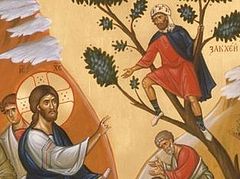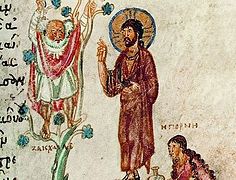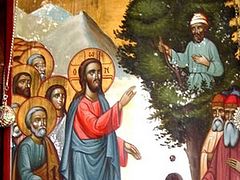Then Jesus entered and passed through Jericho. Now behold, there was a man named Zacchaeus who was a chief tax collector, and he was rich. And he sought to see who Jesus was, but could not because of the crowd, for he was of short stature. So he ran ahead and climbed up into a sycamore tree to see Him, for He was going to pass that way.
And when Jesus came to the place, He looked up and saw him, and said to him, “Zacchaeus, make haste and come down, for today I must stay at your house.” So he made haste and came down, and received Him joyfully. But when they saw it, they all complained, saying, “He has gone to be a guest with a man who is a sinner.” Then Zacchaeus stood and said to the Lord, “Look, Lord, I give half of my goods to the poor; and if I have taken anything from anyone by false accusation, I restore fourfold.” And Jesus said to him, “Today salvation has come to this house, because he also is a son of Abraham; for the Son of Man has come to seek and to save that which was lost.” (Luke 19:1-10)
The Gospel lesson of the tax collector Zacchaeus, at least in the Slavic Orthodox tradition, is always the last Sunday Gospel lesson of the Lucan Gospel cycle of readings (basically autumn into winter). As such, in the Slavic Orthodox tradition it also foretells the coming of Great Lent for with this Gospel we bring the old year to a close and will now move into the Pre-Lenten Sunday Gospel cycles – known in Orthodoxy as the beginning of the Triodion. [Non-Slavic Orthodox tradition proclaims the Gospel of the Canaanite woman before the Lenten Triodion begins. In Orthodoxy variation in practice is quite normal on so many levels. Orthodoxy is not a monolith with all Orthodox always doing all the same things. This has for many centuries been the accepted practice and received Tradition of the Church. What is being done in one Orthodox parish or tradition differs from what is being done in another parish or tradition. This is not seen as dividing the Church or breaking the unity of the “one holy catholic and apostolic church.”]
In past years in my sermons I often joined the chorus of those who trampled on Zacchaeus as a sinner who has a miraculous conversion in his encounter with Christ. It is how the story is often interpreted and because in Slavic Orthodox tradition it is the precursor to Great Lent, a theme of a sinner who repents is often read into the story. But there is another possible interpretation of this Gospel lesson. If one pays close attention to the text, one sees that the Jewish crowd certainly reacts to Zacchaeus as if he is a terrible sinner. They smell the stench of sin on him and are repulsed by the fact that Jesus invites himself to Zacchaeus’ house. But note what Zacchaeus says to Jesus when Jesus is in his home:
“Look, Lord, I give half of my goods to the poor; and if I have taken anything from anyone by false accusation, I restore fourfold.”
Usually this is interpreted that Zacchaeus has a change of heart, a conversion, and the text is saying “from this moment I wlll give and I will restore.”
But in the Greek text Zacchaeus speaks in the present tense – not I will begin doing this, but he states what he is doing. Zacchaeus says he gives half his income to the poor. The crowd has wrongfully presumes Zacchaeus is filthy rich, greedy and dishonest because he is a tax collector. They have judged him harshly without knowing the facts. The crowd is guilty of judgmentalism and presumption. Christ shows the crowd, “you are guilty of misjudging this man.” You are guilty of sin, not him.
The Gospel lesson is thus not so much about repentance but about reconciliation. Zacchaeus was doing the right thing all along, but in secret. The people misjudged him because they saw him as rich and a tax collector, so presumed he was dishonest. But what Christ shows the people is that Zacchaeus is a good man, a true son of Abraham. Christ offers reconciliation between Zacchaeus and the Jewish crowd. Zacchaeus was lost because the people had wrongly rejected him, not because he was a sinner. Christ is thus not converting him from sinner to saint, but revealing the diamond that was hidden beneath the dirt the people had dumped on him. Christ shows the people, he really is more righteous than you who judge and reject him.
It reminds me of a story I read long ago about a hardworking blacksmith in a town whom the people loved because he was known to be so generous in giving charity despite just being a working class person. There also was a rich man who lived on a well-manicured property on a hill above the blacksmith’s shop. This rich man was hated by the townspeople because they thought him miserly – he didn’t associate with people and was not known to ever give in charity. The rich man died and no one attended the funeral just to spite him. The blacksmith simultaneously stopped giving generously in charity. People confronted him about why his behavior changed. He replied, “Did you really think for all these years that I was giving my money in charity? I’m not rich, I never had that kind of money to give. The rich man gave me the money and asked me to distribute it but to never tell anyone its source. I did as he asked for all these years. When he died I no longer had any money to give, for I’m poor like you.” Everyone in the town was amazed by this revelation and shamed by how they had treated the rich man as they realized how badly they had misjudged their benefactor.
For his part, Zacchaeus climbs the tree to see Jesus because he wants to see a rabbi who is teaching what he (Zacchaues) is doing all along. Zacchaeus understands Jesus’ message is different from what is often being taught by other rabbis. Zacchaeus wants to get a glimpse of someone who teaches the way of humility. Zacchaeus is practicing what Jesus teaches:
“Beware of practicing your piety before men in order to be seen by them; for then you will have no reward from your Father who is in heaven. “Thus, when you give alms, sound no trumpet before you, as the hypocrites do in the synagogues and in the streets, that they may be praised by men. Truly, I say to you, they have received their reward. But when you give alms, do not let your left hand know what your right hand is doing, so that your alms may be in secret; and your Father who sees in secret will reward you.” (Matthew 6:1-4 – this is the Gospel we will read on Meatfare Saturday, right before Great Lent begins)
Zacchaeus is living the life that Jesus taught, and Jesus reveals this to the crowd. He reveals to the crowd how their sinful presumptuousness has caused them to misjudge Zacchaeus. It is the crowd which has caused Zacchaeus to become separated from the people of God and to become lost, not Zacchaeus’ own behavior. Jesus offers reconciliation to all if they will have it, if they will lay aside their presumptions. (As we say in Psalm 19:13: “Above all, free your servant from presumption; do not let it sway me! Then shall I be blameless free of grave sin.”)
Please note also in the prayer from the blessing of a home, we mention Zacchaeus:
O God our Savior, the True Light Who was baptized in the Jordan by the Prophet John, and Who was willing to enter the house of Zacchaeus, bringing salvation to him and his household, do You, the same Lord, keep safe from harm those of us who dwell herein; grant us Your blessing, purification and bodily health, and all of our petitions which are for salvation and life everlasting; for You are blessed, together with Your Father, Who is from everlasting, and Your All-holy and Good, and Life-creating Spirit. Amen.
In blessing the home, we bring Christ who is our Salvation into our homes, just like Christ came into the home of Zacchaeus and reconciled him and his family to the people of God. The prayer for the blessing of a home does not mention people repenting as a result of the house blessing, but rather acknowledges the blessing of having Christ present in the home. The prayer assumes that the people in the home being blessed want Christ to be there, just as Zacchaeus wanted Christ to come into his home. And hopefully for the same reason – because those in the home are already practicing righteousness just like Zacchaeus!
Two final thoughts about Zacchaeus who is recognized as a saint in the Orthodox Church:
First, Zacchaeus had a strong desire to see Christ, and though he had a very public position, he was willing to risk embarrassment and humiliation just to see Christ (he had no knowledge that Christ would speak to him or want to come to his house). We who are Christ’s own disciples and family are on the other hand sometimes embarrassed to tell others we are Christian, or even to make the sign of the cross or say a prayer before a meal. We are embarrassed to speak against abortion or racism or against pornography or dirty jokes. We can learn St Zacchaeus’ boldness and courage to live for godly values and to stand against evil in the world. We can pray, fast and given in charity in secret as Jesus taught. But we can also quietly without making a show or trying to draw attention to ourselves, do the good and right things even with our friends watching us.
Second, Zacchaeus publicly admitted he was a sinner. When Christ was in his house, he didn’t proclaim himself as sinless and perfect, rather he acknowledged that if he defrauded anyone, he then tried to make it right to them. He publicly repented of his sins – not mistakes but the wrong things he chose to do. Just think about our public officials today when – even when proof is offered of their misdeeds, they tend to deny, obfuscate, cover up, go on the attack. They lack honesty, integrity, humility and courage – all traits which Zacchaeus demonstrated. We should think about Zacchaeus as we prepare for our own confessions. When we stand in the presence of Christ we can admit to our sins. Christ wants to be in our presence, in our homes, in our lives and Christ does not stay away from us because He knows we are sinners. Rather, as He himself said, He came to seek and save the sinner. He came to seek and save all of those who have become separated from the people of God. In confession, we invite Christ to come under the roof of our heart and to live with us.





What made Zacchaeus want so much to see Christ that he made a fool of himself and climbed a tree? St Cyril of Alexandria says that ‘a seed of salvation sprang up in him’. How? St Ambrose says ‘doubtless he heard’ what Christ had said to the rich young ruler (Luke 18:22) and his conscience was pricked. Possibly, then, from that time ‘a few days before’ as St Ambrose says, Zacchaeus had started to give away his riches, and what he needed was Christ’s blessing and, unlike the rich young ruler, he followed Him.